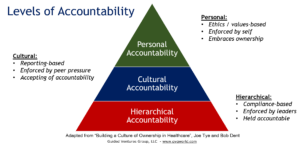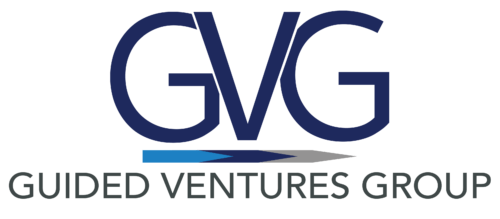
We love a good challenge at GVG. One of our favorite New York Healthcare clients asked if we could develop an engaging and enlightening workshop for their Compliance week celebration.
After 14 years in financial services, we know compliance and ethics are important. But how do we make it “Sexy”? What would make compliance so appealing that people will voluntarily show up and engage in training? That was the challenge.
Here is what we learned.
1. Tie compliance and ethics back to accountability and ownership
Every organization we work with is seeking the “ownership holy grail”. How do we get people to take responsibility for both acting in a compliant and ethical manner and also speaking up when they see someone else acting out of alignment? At the end of the day, our goal in every organization and our personal life is to create a culture and mindset of ownership. That means we also need to understand how accountability works.
One of our favorite models is the levels of accountability pyramid from Joe Tye and Bob Dent. The highest level, personal accountability, is the jumping-off point for a true culture of ownership. When we work from a place of personal accountability, or what we do when no one is watching, we are working from our internal ethics. When we work from a place of hierarchical accountability, or what someone else is making us do, we are working from a place of compliance. Tying these concepts together helps us understand the reasons for why we do what we do. Developing a culture where people are motivated by personal accountability over hierarchical accountability not only drives greater business value but also embodies a more compliant and ethics-based organization.

2. Connect to the Compliance Team at a personal level
Compliance is often considered a scary, police like function by many people inside organizations. When we work with more progressive Compliance teams, they show up as collaborators, not a police force. Yes, they deal with auditors and government entities. Yes, they are responsible for ensuring we are following the regulations of our industry. However, they cannot be the police force. They are here to support. When we did this workshop (which we ran live 4 times to cover an audience of 700), we brought the lead Compliance Officer front and center during the session and did a short “zoom-side chat” as part of our workshop so people could get to know her personally. She talked about her philosophy around compliance, her personal journey, and why she worked for the current organization. People connected with her at a personal level in this process, making compliance less scary. Evidently, her email box and other internal compliance training programs are exploding as people want to engage and get to know her and the Compliance team better. Human connection for the win!
3. Share strategies that apply to all parts of life, not just work
Why come to training…especially compliance training? Think back to the audience WIIFM (what’s in it for me). Other than staying out of jail, paying fines, or losing your job (all fear-based motivations), why would someone WANT to show up for compliance and ethics training? Find ways to make training and compliance programs based on expansion and growth mindset ideas instead of being fear-based. One way to do this is to help people build skills that apply in their personal life, not just professional life. The line between personal and professional life is no longer just blurry, it’s now dropping away completely! Progressive organizations know this. They are building life skills that apply at work versus only work skills that stand in isolation. Training that supports taking ownership for all aspects of your life (professional, personal, family, health, etc…) not only benefits your compliance program, it also engages your people because it is personal in its application.
Hopefully, we have provided a few ideas on how to make compliance more interesting AND how to foster a culture of ownership. If you are interested in more information, reach out!
Enjoy the journey, in a compliant and ethical way!




